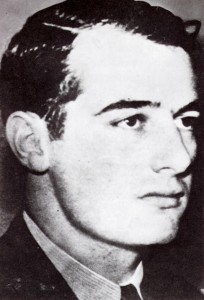On this day in 1945, Raoul Wallenberg was summoned to Red Army headquarters in Budapest, Hungary. Before setting off, he confided to one of his closest associates: “I do not know whether I am a guest of the Soviets or their prisoner.” Wallenberg was never seen a free man again – disappearing forevermore into the Soviet Gulag. It was a cruel and improbable fate for this wealthy, soft-spoken thirty-two-year-old Swede who had saved tens of thousands of Hungarian Jews from certain death since his diplomatic appointment to Budapest in July 1944. Wallenberg had miraculously survived the Nazi occupation of Hungary and Adolf Eichmann’s personal threat to kill him. He’d also survived the equally ruthless and fascistic Hungarian Arrow Cross regime. So when the Soviet Army entered Budapest in January 1945, his superhuman mission to save the Hungarian Jews was seemingly over… 100,000 Jews were still alive in the capital, and most owed their lives to the extraordinary efforts of the Swedish diplomat. He should have been able to return home to Sweden in glory and honour. But Raoul Wallenberg had survived one tyranny only to fall victim to another.
In the spring of 1944, Adolf Eichmann arrived in Hungary with orders to dispose of the country’s Jews. In a bid to mount a secret rescue effort, the USA’s newly formed War Refugee Board approached neutral Sweden with a plan to send an agent to Budapest to work under diplomatic cover in the Swedish embassy. Intelligent, determined and from one of Sweden’s wealthiest families – sure to impress the Nazis – Raoul Wallenberg emerged as the ideal candidate. By the time he reached Budapest in July of 1944, some 400,000 Hungarian Jews had already been sent to Auschwitz for extermination. Approximately 200,000 Jews remained, and Wallenberg determined to save them all. He cajoled, intimidated and bribed Axis officials. He established an elaborate network of spies within the Hungarian fascist party and the Budapest police. When Jews had no authentic identification papers, Wallenberg forged documents and flourished them authoritatively – even placing himself between Nazi officials and Jews. Upon receiving a threatening message from Eichmann – “Accidents do happen, even to a neutral diplomat” – Wallenberg ignored it. “When there is suffering without limits,” he countered, “there can be no limits to the methods one should use to alleviate it.”
The pressures on Wallenberg intensified in October 1944 when the Hungarian Nazi Party, the Arrow Cross, seized power and vowed to finish what Eichmann had started. With Budapest’s remaining Jewish population in danger of imminent deportation, Wallenberg and his staff – including many Jews he had recruited – embarked on the large-scale issuance of forged passports that carried the protective Swedish royal seal. The Hungarian Nazis were at first duped by the flashy objects, but they soon grew intolerant of the impudent Swede. With his own life in ever-increasing danger, Wallenberg refused to abandon his crusade – but by the end of 1944, he was forced to retreat into Budapest’s dangerous underground network of safe houses. And so it was with great relief that Wallenberg greeted the occupying Russians. Although his mission was officially over, he requested a meeting with the new liberators to discuss the resettlement of Jewish refugees. The Soviets were equally eager to speak with this unlikely American-associated saviour of Jews, and asked Wallenberg to report to their headquarters for questioning…
For years after the disappearance of Raoul Wallenberg, the Russians maintained that he was not in their custody. Yet more than a dozen former Soviet prisoners who made it back to the West reported seeing the missing hero of Budapest in various Moscow prisons. Under increasing diplomatic pressure from Sweden, the Soviets eventually admitted that Wallenberg had died of a heart attack on 17th July 1947. Years later, however, an accumulation of testimonies alleged that he had been alive into the 1950s. In November 2000, Russia announced that Wallenberg had in fact been executed by KGB agents in Moscow’s Lubyanka Prison. No date was given, and no documented evidence for this claim has been found thus far.
Raoul Wallenberg is an unqualified hero and a beacon of humanity during one of our darkest chapters. His disappearance at the hands of the Soviets and the subsequent cover-up is an unsavoury reminder that Russians have historically hated Jews almost as much as the Nazis. Furthermore, Wallenberg’s single-handed feat in saving so many thousands of lives is stark evidence that the governments of Great Britain and the USA could and should have done much much more to rescue Europe’s Jewry.



4 Responses to 17th January 1945 – the Disappearance of Raoul Wallenberg